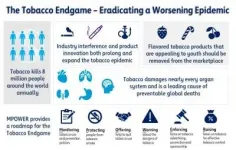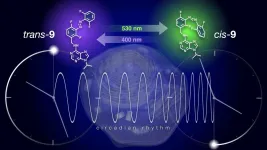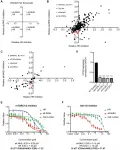The organizations are urging governments to take immediate action to implement the World Health Organization's MPOWER framework, which outlines six essential policy approaches proven to reduce tobacco use: Monitor tobacco use and prevention policies; Protect people from tobacco smoke; Offer help to quit tobacco use; Warn about the dangers of tobacco; Enforce bans on tobacco advertising, promotion and sponsorship; and Raise taxes on tobacco.
The joint opinion outlines comprehensive tobacco prevention strategies that are necessary to fully implement the MPOWER framework, including:
Lowering the nicotine concentrations in all combustible tobacco products. Further research to understand the health impacts of nicotine on the cardiovascular system and the long-term effects of electronic cigarettes. Enforcement of strong systems and premarket assessments of all tobacco products. Strong regulation of tobacco industry marketing to ensure false health claims are not made about products that have not been thoroughly researched and authorized through regulatory review. Greater global action to remove all non-tobacco flavored products from the market. Raising the price of all tobacco products, through excise taxes and other means. Youth-targeted counter-marketing campaigns to effectively reduce tobacco use among youth. Access to comprehensive, evidence-based cessation services as a safer alternative for adults who wish to quit smoking combustible cigarettes.
Despite global reductions in tobacco use, the growing popularity of electronic cigarettes and other newer tobacco products that appeal to youth with flavorings threatens progress toward ending tobacco use and nicotine addiction - the "tobacco endgame." Countries must effectively regulate electronic cigarettes and other emerging tobacco products to protect young people and improve public health worldwide.
The joint opinion is being published simultaneously in the flagship journals of all four organizations: the Journal of the American College of Cardiology (JACC), the Journal of the American Heart Association (JAHA), the European Heart Journal (EHJ) and Global Heart.
Organizational Quotes:
"We are proud to join with our global public health colleagues to call for swift action to end tobacco use and nicotine addiction worldwide," said Mitchell S. V. Elkind, M.D., MS, FAAN, FAHA, president of the American Heart Association. "The evidence-based strategies that have been successfully implemented in countries around the world, from government regulation to tobacco taxes to funding for prevention and cessation programs, would make an enormous difference if implemented on a global scale. The time is now to redouble our efforts to reach the tobacco endgame by ending tobacco use and nicotine addiction worldwide."
"Nicotine can cause serious health risks to the cardiovascular system at all stages of life," said Athena Poppas, MD, MACC, immediate past president of the American College of Cardiology. "Nicotine may increase a person's blood pressure, heart rate and flow of blood to the heart, narrow the arteries and harden the arterial walls, which in turn can lead to a heart attack. Nicotine also impacts brain development and poses dangers to youth, pregnant women and the developing fetus. There needs to be a greater understanding of the impacts of nicotine on cardiovascular health and nicotine delivery products on children and youth to inform further treatment and regulatory approaches to nicotine."
Professor Stephan Achenbach, President of the European Society of Cardiology stated: "Today the ESC joins other leading professional organizations in cardiovascular healthcare to send a strong, global message calling for public health campaigns and legislation to fight tobacco and, in particular, to deter vaping. There is increasing evidence on the adverse effects of e-cigarettes. New measures are needed to stop marketing campaigns for e-cigarettes and flavored tobacco, especially those targeting young people."
"Tobacco use is the single greatest preventable cause of death in the world today, with the majority of deaths occurring in low- and middle-income countries as a result of aggressive marketing campaigns by the tobacco industry in these regions," said Fausto Pinto, President of the World Heart Federation. "The World Heart Federation is fully committed to fighting the global epidemic of tobacco consumption and tobacco addiction, and we encourage governments to accelerate implementation of the World Health Organization Framework Convention for Tobacco Control and the MPOWER package. Most importantly, governments must take steps to increase taxes on tobacco and nicotine products - the single most effective measure to reduce the consumption of these deadly products."
INFORMATION:
About the American Heart Association
The American Heart Association is a leading force for a world of longer, healthier lives. With nearly a century of lifesaving work, the Dallas-based association is dedicated to ensuring equitable health for all. We are a trustworthy source empowering people to improve their heart health, brain health and well-being. We collaborate with numerous organizations and millions of volunteers to fund innovative research, advocate for stronger public health policies and share lifesaving resources and information. Connect with us on heart.org, Facebook, Twitter or by calling 1-800-AHA-USA1.
About the American College of Cardiology
The American College of Cardiology envisions a world where innovation and knowledge optimize cardiovascular care and outcomes. As the professional home for the entire cardiovascular care team, the mission of the College and its 54,000 members is to transform cardiovascular care and to improve heart health. The ACC bestows credentials upon cardiovascular professionals who meet stringent qualifications and leads in the formation of health policy, standards and guidelines. The College also provides professional medical education, disseminates cardiovascular research through its world-renowned JACC Journals, operates national registries to measure and improve care, and offers cardiovascular accreditation to hospitals and institutions. For more, visit acc.org.
About the European Society of Cardiology (ESC)
The ESC brings together health care professionals from more than 150 countries, working to advance cardiovascular medicine and help people to live longer, healthier lives.
About the World Heart Federation
The World Heart Federation (WHF) unites the cardiovascular community and drives the agenda to reduce the global burden of cardiovascular disease and help people live longer, healthier lives. Together with our Members, we are working to end needless deaths and build global commitment for improved cardiovascular health at the global, regional, national and community levels. We believe in a world where heart health for everyone is a fundamental human right. To learn more, visit worldheart.org.
For media inquiries please contact:
Suniti Sarah Bal - 916-390-1860; suniti.bal@heart.org
Dana Kauffman - 202-375-6294; dkauffman@acc.org
Jackie Partarrieu, Media Team Manager, ESC, press@escardio.org
Mihela Kralj, Communications Manager, WHF, mihela.kralj@worldheart.org







